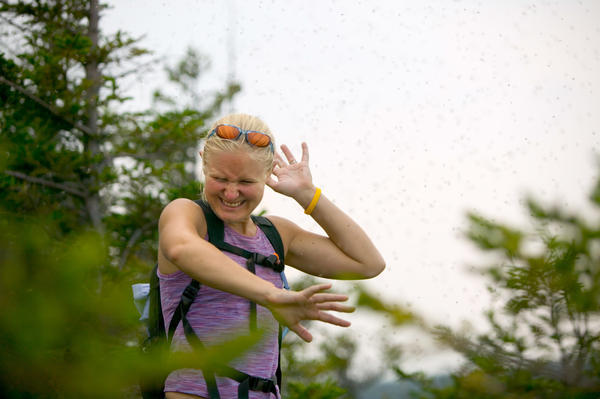
Is Mosquito Season Getting Longer?
Warm weather lets us enjoy all kinds of outside activities…barbecues, picnics, watching and playing sports, camping, and just generally hanging out. One downside to all of this fun is mosquitoes. With warming temperatures worldwide, mosquito season is now longer in many parts of the world, including in many parts of the United States.
How long does mosquito season last? Longer than we wish!
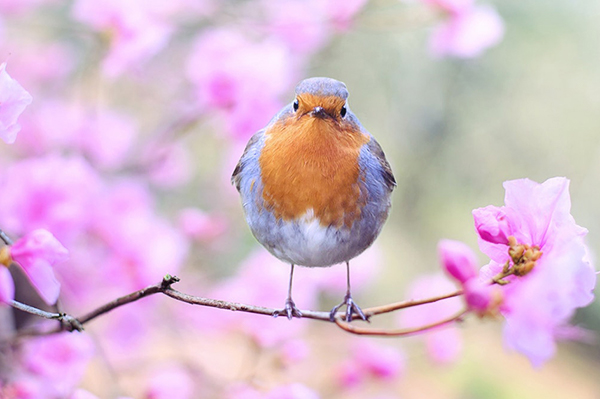
When does mosquito season start?
Unfortunately, it starts much earlier than you might think! Some species of mosquitoes have the ability to hibernate during the winter, and eggs from some species can survive even in very cold temperatures. When the weather reaches just 50 degrees Fahrenheit, these mosquitoes can quickly get to work biting people and laying eggs to create more mosquitoes. When larger numbers of eggs or hibernating mosquitoes survive winter thanks to warmer temperatures, this means the mosquito population can expand very quickly as soon as the weather hits 50 degrees. When does mosquito season start? When the temperature hits 50 degrees!
When is peak mosquito season?
Mosquitoes do not have the ability to regulate their own temperature, they rely on external sources (primarily the sun, but also your heated home) to survive. In the parts of the world that have seasons, as temperatures increase, so do mosquitoes! The warmest months of the year are peak mosquito season. Warm weather makes mosquitoes more active which means they lay more eggs which leads to more mosquitoes and so on. With climate change, many places are experiencing longer periods of very warm weather, and with that, larger mosquito populations than before.


How does climate change affect mosquitoes?
In addition to warming temperatures, climate change is also associated with increased humidity, heavier rainfall, and flooding. All of these things are good news for mosquitoes and not so good news for people.
As we stated above, mosquitoes love warm weather and as new geographic areas become warmer, mosquitoes can move in and thrive. Heavy rainfall and the resultant flooding will lead to more areas of standing water which are ideal for mosquito breeding. Some species of mosquitoes can lay eggs in just a bottle cap of water, but having a nice big puddle is even better.
Warmer temperatures and increased humidity enable mosquito eggs to mature more quickly, meaning mosquito populations can grow even faster. In the past few years, there have been very significant flood events following hurricanes which have resulted in huge mosquito populations developing in very short amounts of time.
Scientists are finding increasing evidence that climate change is at least partly responsible for mosquito borne diseases (for example, West Nile virus and Dengue Fever) starting to transmit in areas where they previously were not found.
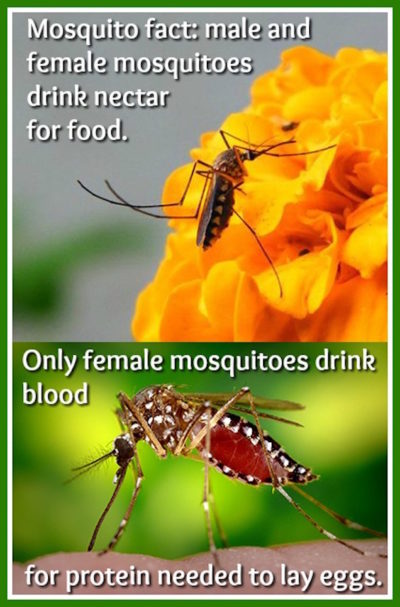
Did you know that only female mosquitoes bite people?
Most people don’t realize that male and female mosquitoes drink plant nectar for food. The mosquito that’s biting you? That’s a female mosquito who needs the protein from your blood in order to be able to lay eggs.
Female mosquitoes also bite birds and animals to obtain the blood protein needed to lay eggs. Some viruses, like West Nile virus (the most common mosquito borne virus in the United States), is found in birds and animals. The birds and animals do not get sick from this virus, they just serve as reservoirs of the virus. When a female mosquito bites an infected bird or mammal (or person), she can then pass the virus on to multiple people when she bites them.
You may read about scientists testing birds for various mosquito borne diseases in addition to trapping mosquitoes and testing them. By determining if a mosquito borne disease is in a bird/animal/or mosquito population, mosquito control boards are able to formulate integrated plans to prevent the spread of disease. This may include aerial spraying of EPA-approved insecticides, removing stagnant water (where possible) and encouraging residents to do the same, introducing mosquito fish into ponds so they will eat larvae, etc.

With longer mosquito seasons, does transmission of mosquito borne disease increase?
The answer is, it depends. When there is a bigger mosquito population in an area where there are mosquito borne diseases, then at least in theory, more mosquitoes will have a chance of picking up a disease and passing it on to people. If an area has strong integrated mosquito control management in place, then more mosquitoes will not necessarily mean more disease.
The important thing to remember is that no matter how long the mosquito season is in your area (in many parts of the world, mosquito season never ends), if there are mosquito borne diseases present, it is essential to avoid getting mosquito bites.
People can take prophylactic drugs to help prevent Malaria, and there is a vaccine against Yellow Fever.
But for many mosquito borne diseases, including West Nile Virus, Zika Virus, Dengue Fever, Chikungunya, Eastern Equine Encephalitis, LaCrosse Encephalitis, and others, there are no vaccines or prophylactic drugs. The only way to avoid getting these diseases to avoid mosquito bites.
How can mosquito nets help keep you safe?
As we stated above, the most important way to prevent mosquito borne disease is to not get mosquito bites. Mosquito nets are an essential tool in the battle against mosquito bites!
Mosquito nets come in all kinds of styles and sizes, meaning that no matter what you might want to cover, there is most likely a net out there that can do it.
Mosquito nets are lightweight and easy to carry with you and hang wherever you might need them. Mosquito nets work best when they are properly tucked in…tucked into a mattress or secured to the ground in some way.
For example, if you’re hanging a net over a table and chairs, hang the net so that it drapes a bit on the ground. If there’s any kind of breeze, you’ll want to anchor the net. This gives you an opportunity to get creative…you can anchor a net with flower pots, wine bottles, rocks, pieces of wood, etc. You can make your net anchors decorative to add a festive flair to your bug-free outdoor dining area. When properly used, mosquito nets ensure that mosquitoes (and other bugs) can’t get to you!
Many people only think of covering beds with mosquito nets. That is, indeed, a very good idea, because when we are sleeping, we are easy targets for blood-thirsty female mosquitoes who could be carrying disease.
Covering beds, cribs, cots, or anywhere else people are sleeping is a great idea not only for mosquito protection, but also to keep away spiders, millipedes, flies or any other bug that might be in your space. If you are sleeping outside, sleeping under a mosquito net (that is properly tucked in) will also keep lizards, snakes, mice, etc. from getting near you.
In addition to covering beds, mosquito nets can be used in lots of other ways to help prevent mosquito bites:
- The best way to protect baby’s skin from mosquito bites is with mosquito nets…use them on cribs, bassinets, playpens, strollers, etc. Here is one that will do all of that!
- Hang a net over a chaise lounge to make a lovely outdoor reading/relaxing spot
- A mosquito net will easily cover most porch swings
- Hang a large net over a kiddie pool to keep away mosquitoes, bees, etc.
- Cover a picnic table
- Going to the drive-in? Hang a mosquito net over your open car windows/doors
- Use mosquito nets to cover tents, eating areas and hanging out areas while camping
There are a million more ways you can use mosquito nets. Essentially any time you’re hanging out, you can probably put up a mosquito net to keep mosquitoes and other bugs away!
How long is mosquito season? Too long! So it’s a good idea to learn more about preventing bites and mosquito borne disease.

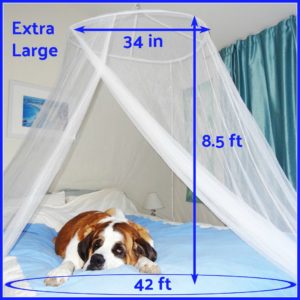
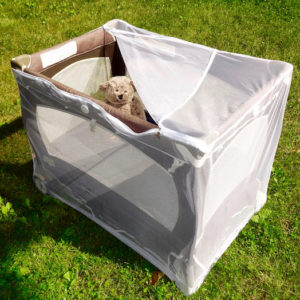
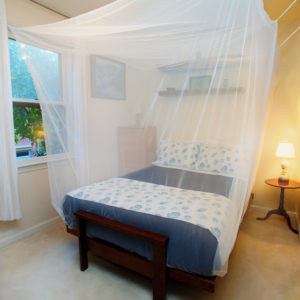
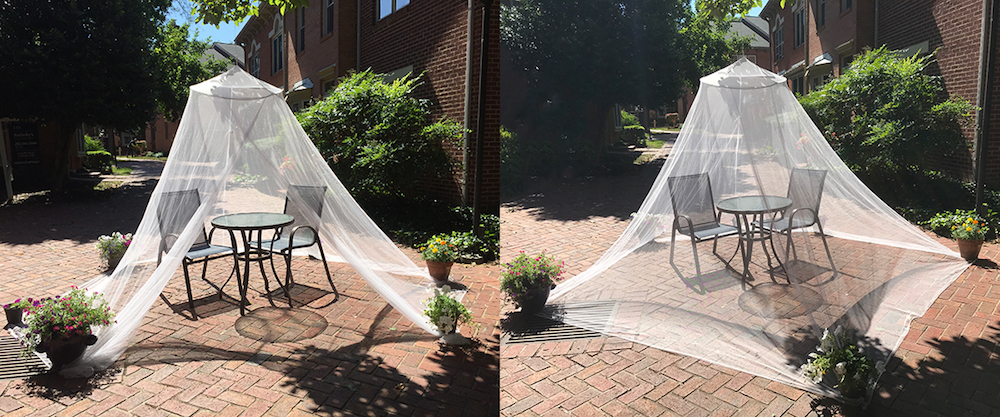
Leave a Reply
Your email is safe with us.